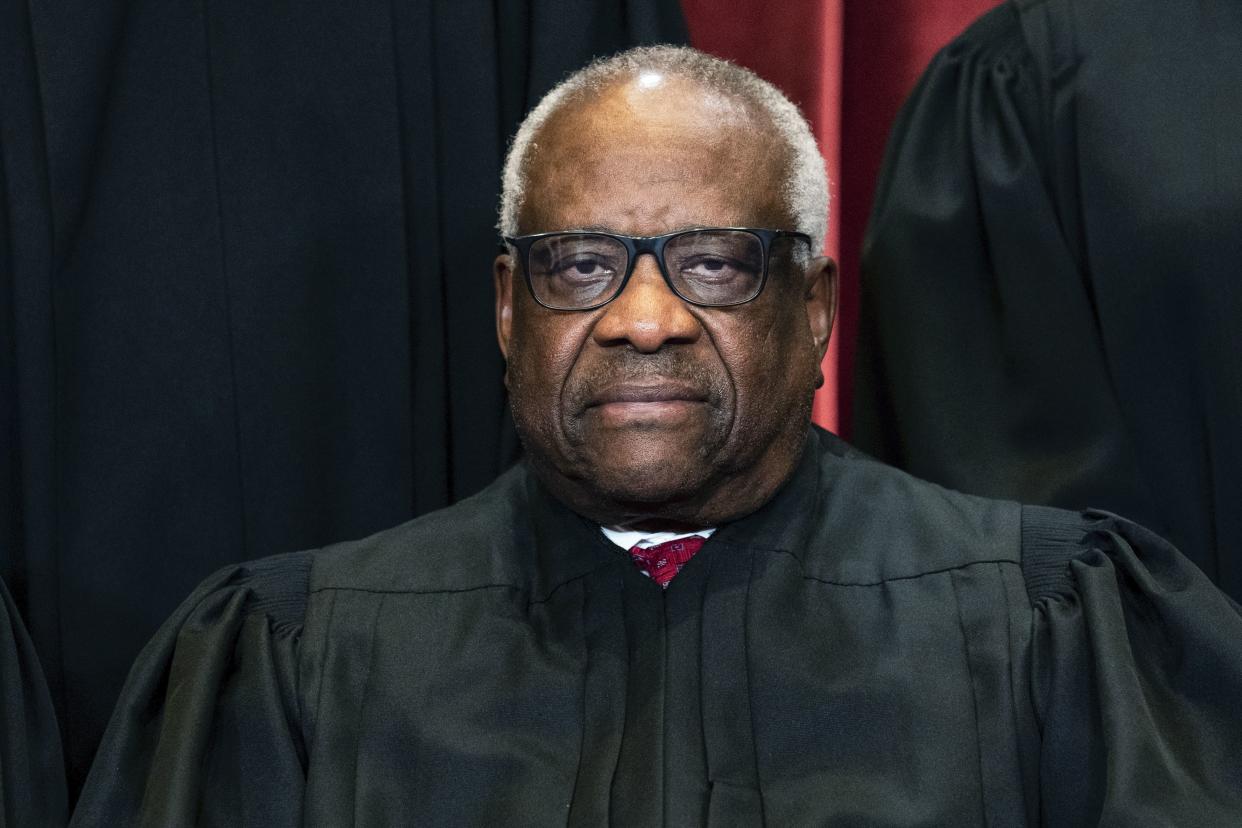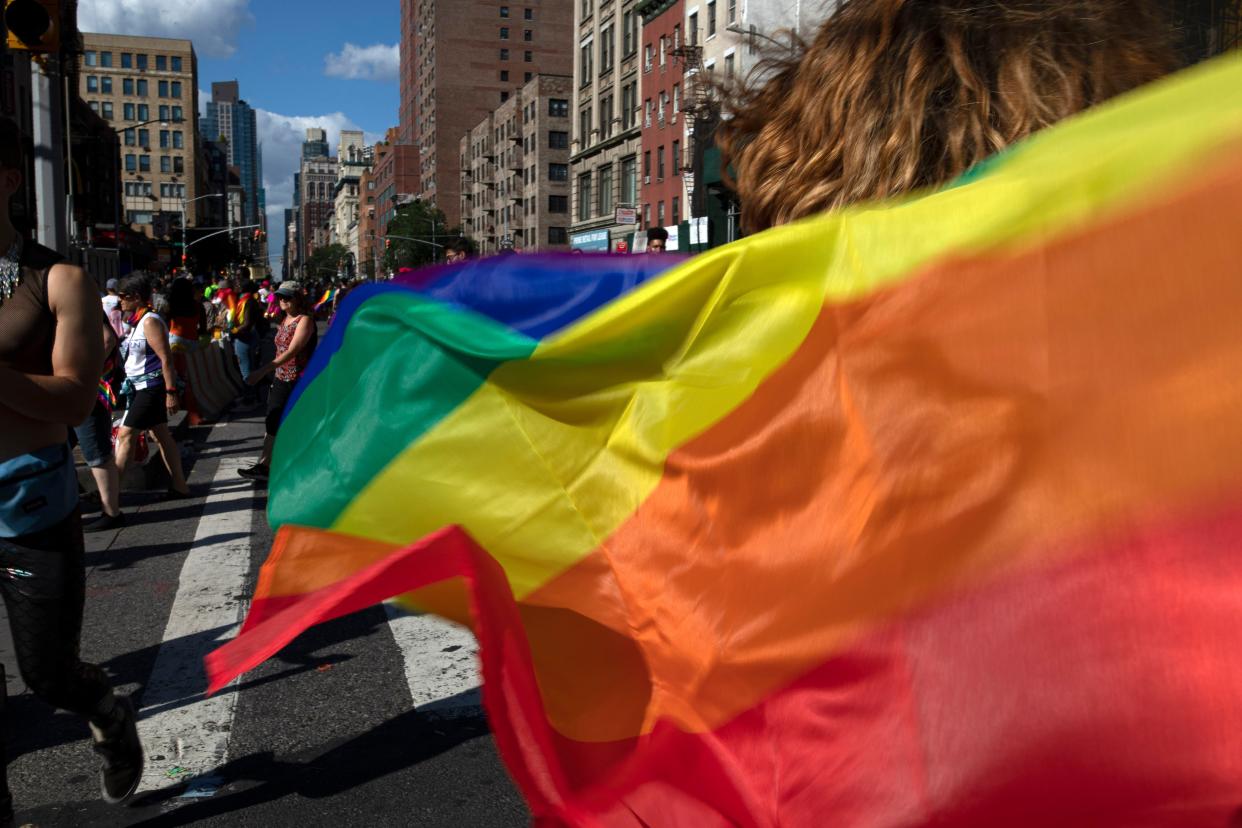Justice Clarence Thomas says Supreme Court should revisit right to same-sex intimacy, marriage
In a concurring opinion in the Supreme Court’s ruling on Friday ending the constitutional right to abortion, Justice Clarence Thomas urged the court to reconsider past rulings ensuring the rights to same-sex marriage, to same-sex intimacy and to birth control.
The majority opinion, by Justice Samuel Alito, said the momentous ruling should not be seen as casting doubt on long-standing precedents other than the half-century-old right to abortion established in Roe v. Wade.
Thomas, in his concurring opinion, said he agreed on that point, but added, “For that reason, in future cases, we should reconsider all of this Court’s substantive due process precedents.”
He listed off three decisions: Griswold v. Connecticut, the 1965 ruling protecting married couples’ rights to contraception; Lawrence v. Texas, the 2003 decision that protected the right to same-sex sexual activity; and Obergefell v. Hodges, the 2015 case protecting the right to same-sex marriage.

Supreme Court Justice Clarence Thomas sits during a group photo at the Supreme Court in Washington, D.C. on Friday, April 23, 2021. (Erin Schaff/)
Thomas, 74, who is often seen as the court’s most conservative justice, was not joined in his concurring opinion by any other jurist on the nine-member court.
He dissented in two of the cases he raised, Lawrence v. Texas and Obergefell v. Hodges, and he was not on the court when Griswold v. Connecticut was decided.
His willingness to publicly target the rights alarmed Democrats, who were already reeling from an anti-abortion rights ruling once seen as unthinkable.
Former President Donald Trump remade the Supreme Court during his single term in office, appointing three new justices who have tilted the court far to the right. The current court has a six-to-three conservative majority.
Responding to Thomas’ concurring opinion, Rep. Ritchie Torres, a New York Democrat, tweeted that the court was “imposing a reactionary right-wing political agenda under the guise of judging.”
“During Pride Month, Justice Thomas announced to the world his crusade to overturn the privacy, intimacy, and marriage equality of the LGBTQ community,” Torres said in the post.

FILE - In this June 30, 2019, file photo parade-goers carrying rainbow flags walk down a street during the LBGTQ Pride march in New York, to celebrate five decades of LGBTQ pride, marking the 50th anniversary of the police raid that sparked the modern-day gay rights movement. (Wong Maye-E/)
And at City Hall, Mayor Adams described the abortion ruling, Dobbs v. Jackson Women’s Health Organization, as a “plan to look at all the things that they’ve been waiting to dismantle.”
“I would say to New Yorkers and Americans, be very afraid,” Adams told his city, a crucible of the gay rights movement. “That fear should turn into mobilization. That fear should play out as making the decision of electing the right people to make the decision on who’s going to be our Supreme Court justices.”
The mayor also said he would support expanding the Supreme Court, breaking with President Biden, who has resisted supporting any moves in that direction, but charged a commission with studying the matter. The commission released a report in December that did not take a strong position on court expansion.
The court’s approval rating has dropped significantly in recent years, according to opinion polls.
Its abortion decision Friday steamrolled over precedent, voiding the 1992 Planned Parenthood v. Casey ruling reaffirming Roe.
Noah Feldman, a constitutional law professor at Harvard, said the new ruling would invite states to pass laws undermining the rights to same-sex marriage and contraception. He predicted that the Supreme Court could decide to revisit the issues within the next three years.
“The Supreme Court will have no choice but to weigh in and replay the analysis in these landmark cases,” Feldman said. “And when they do so, they’re going to come under tremendous pressure to follow the logic of the opinion that they wrote here.”
The court’s three liberal justices — Stephen Breyer, Elena Kagan and Sonia Sotomayor — expressed intense dismay at the abortion ruling, joining a sharply worded dissent that said: “After today, young women will come of age with fewer rights than their mothers and grandmothers had.”
And they raised concern about the future of the court, and where its rulings may go.
“Assume the majority is sincere in saying, for whatever reason, that it will go so far and no further. Scout’s honor,” the dissent said. “Still, the future significance of today’s opinion will be decided in the future.”
“And law often has a way of evolving without regard to original intentions — a way of actually following where logic leads, rather than tolerating hard-to-explain lines,” the liberals wrote. “Rights can contract in the same way and for the same reason — because whatever today’s majority might say, one thing really does lead to another.”
With Michael McAuliff
